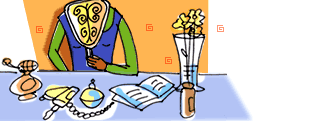The Rediff US Special/ Chitra Banerjee Divakaruni


Best-selling novelist Divakaruni's newest book, The Unknown Errors of Our
Lives, a collection of stories, will be published in mid-April
In the Calcutta of the fifties, when I was born, the family didn't say, "Not
another girl. How will we ever find the money for the dowry?" Those were
enlightened times. They knew girls were important and worth loving. They
would educate me, and that would be better than any dowry.
But they did say, "Too bad she's so dark." Because that was what separated
Premium Quality from Econo-Pack. Fair skin.
As I grew older they said, "Rub turmeric and milk cream on your skin and
every day after school. Try not to go outside so much, and make sure you
carry a parasol. Take swimming lessons? Never! You'll turn your skin black as
coal." They said, "Dear, not that bright red color. That only looks good on
fair girls."
I fumed, I wept, I said wicked things. They said, "We're telling you this for
your own good. Otherwise no one will marry you, not even if you have a PhD
and a job in a big office."
They were right. The matrimonial ads in the newspapers wanted only
"wheat complexioned" girls. Movie posters showed heroines with impossibly
pink cheeks. On the radio, we heard commercial after commercial for Lakme
whitening cream.
Where did this obsession come from? Was it part of a leftover colonial
mentality? Was it because historically the wives of the rich, who never had
to work in the fields, were light-skinned? Was it because fair skin was a
rarity?
By my senior year of high school, I stopped speaking up in class. I stopped
going to all girls table tennis (one of the few sports I was allowed because
it was played indoors). I started eating too much and put on weight.
Then, Miss Bose, my social studies teacher, called me to her office. She
asked me why my grades were going down and which colleges I was applying
to.
I told her I wasn't interested in college. "What's wrong with you?" she said
angrily. "A smart girl like you, throwing your chances away?"
I don't know what made me tell her. Perhaps because she was dark herself and
unmarried (though she didn't seem unhappy about that fact as she rode up to
school each day on a jaunty yellow scooter). "What's the use," I remember
ending.
If I'd expected sympathy from her, I didn't get any. She stared at me for a
moment, then told me I was to write my term paper on the Miss World Beauty
Pageant.
Sadist, I thought as I stomped away.
But as I looked up articles and photos in the library, something started
happening. I saw many good-looking women -- and they were all different:
sharp-featured, snub-nosed, tall and willowy, short and curvy. And several
were dark -- much darker than me.
It would take me years to throw away my tubes of whitening cream to enjoy
walking bareheaded in the sun. But that afternoon in the library I took the
first step. I photocopied the picture of Miss Nigeria, whom I thought
particularly attractive, and hid it in my underwear drawer. Whenever I felt
ugly I looked at her, and she reminded me that there are many ways of being
beautiful. Instead of hankering after something unattainable and unnatural, I
needed to appreciate what I had and make the best of it.
Before graduating, I gave Miss Bose a red scarf as a thank-you gift. I think
she got the message. She wore it at our graduation ceremony, and when she
clapped for me, she was dazzling.
Illustration: Lynette Menezes
Back to
top
Tell
us what you think of this feature